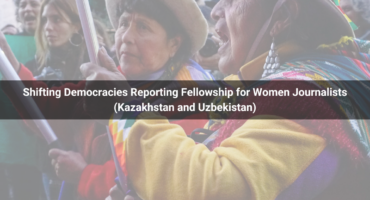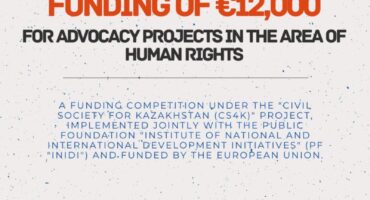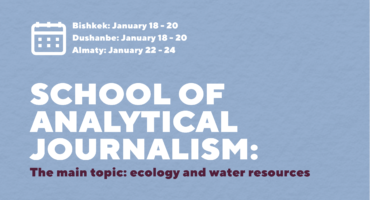Teams of journalists, students and teachers worked together on projects to reveal methods of manipulation in media, fakes in texts, photos and videos for three days.
Three days, four joint sessions, six master classes, nine teams and almost 24/7 work on projects – this was the mode of the MisInfoQuest.
The event organised by IWPR Central Asia with the support of the British government under the project of new media and digital journalism development in Central Asian states brought participants from Kazakhstan, Kyrgyzstan, Tajikistan and Uzbekistan together in the city of Nur-Sultan.
All of them worked on their projects in teams consisting of practising journalists, teachers and students of journalism faculties. The participants not only developed the idea of their story, but also implemented it under the supervision of mentors from Central Asia and Ukraine for three days.
A panel discussion “New media, new challenges in Central Asia” was held during the MisInfoQuest. Its participants – editors and fact checkers from Kazakhstan, Kyrgyzstan, Tajikistan, Uzbekistan and Ukraine – told about how new media changed the role and objectives of journalists and journalism and how contemporary media adapt to such changes in these countries.
Ukraine-based trainers – Olga Yurkova, a journalist and cofounder of independent Ukrainian organisation StopFake.org, and Elena Churanova, a fact checker of the StopFake.org project and media expert – told about the Ukrainian experience of battling misinformation and how to identify fake news. Please see below for full record of the panel discussion.
The session held by Evgeniya Motorevska, a producer of documentaries of independent agency of journalistic investigations Slidstvo.Info (Ukraine), arouse much interest. She told about her project – an investigation movie “I am bot”, which proved the existence of “bot farms” and explained how they worked.
Also, master classes on multimedia journalism and new media formats by Gulim Amirkhanova (Kazakhstan), on data analysis and data journalism by Altynai Mambetova (Data school, Kyrgyzstan) were held during the event. Editor of Hook.Report, Boris Zhukovsky (Uzbekistan), held a session on critical thinking, and Dmitry Zavyalov, a programme coordinator of the IWPR representative office in Tajikistan, told participants about how to pitch their stories properly.
An editor of the Factcheck.kz project, Pavel Bannikov, held a session of fact checking tools and terms, described the difference between a fake, a rumour and a prank, and also gave practical assignments on photo reviewing.
Посмотреть эту публикацию в Instagram
Along with general sessions and master classes, all participants worked on their own projects and applied their knowledge in practice. Nine teams and nine projects will be published on CABAR.asia platform and on partner resources.
А три лучших проекта по мнению жюри, состоявшего из медиаэкспертов, юристов и редакторов, были награждены призами.
This project was prepared by Institute for War and Peace Reporting (IWPR) with the financial support of the UK government. The opinions expressed during events and / or in the articles do not reflect the position of the donor or IWPR.
If you have found a spelling error, please, notify us by selecting that text and pressing Ctrl+Enter.






